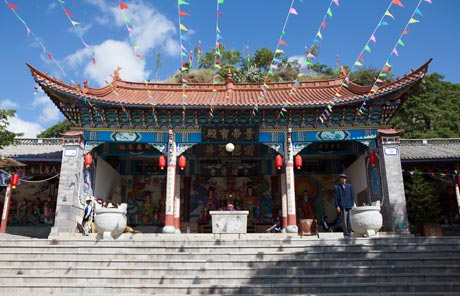Panda power to heal tsunami wounds
Updated: 2011-10-18 08:00
By Cang Wei and Huang Zhiling (China Daily)
|
|||||||||
BEIJING - A pair of giant pandas could be on their way to a zoo in the tsunami-affected area of Japan.
"It will be a heartwarming event if pandas are successfully sent to Japan to cheer the children up," said Zhang Jingshuo, an assistant professor of zoology under the Chinese Academy of Sciences.
The idea originated from correspondence between Premier Wen Jiabao and a Japanese girl he met during his visit to Miyagi prefecture in late May following the magnitude-9 quake and ensuing tsunami that struck Japan on March 11.
According to Japan's Mainichi Daily News, the girl wrote to Wen after his visit, saying she loves pandas and often goes to see them when she travels. The premier reportedly sent a reply inviting her to China.
Mayor of the disaster-hit city of Sendai, Emiko Okuyama, said she has communicated with the Chinese ambassador about leasing pandas to the city-run Yagiyama Zoological Park, according to Mainichi.
The Japanese central government would back the bid if the zoo asks for its support, Mainichi said.
An application for leasing two pandas to Japan has been received and is being processed, said the department of wildlife conservation and nature reserve management under the State Forestry Administration.
However, there is a complicated application procedure and approvals from many departments are required.
Officials from the Wolong National Nature Reserve and the Chengdu Research Base of Giant Panda Breeding in Sichuan province, the two major suppliers of pandas sent overseas, told China Daily that they have not received any information on leasing pandas to Japan's quake zone.
Despite concern about radiation from the nearby nuclear power plant that was damaged in the quake, Zhang Hemin, chief of the administrative bureau of the Wolong reserve, said that pandas can live safely in Japan.
"Pandas will be safe if the people there are safe," said Zhang Hemin.
The pandas' habitat would be examined by Chinese experts before they are leased, and the experts would accompany the pandas to the designated city to guarantee their health, said Zhang Jingshuo with the Chinese Academy of Sciences.
He also said that Japan is doing well in wildlife protection, and China should take this opportunity to learn from Japan's experience and its advanced technology in animal conservation.
China gave a pair of pandas to Japan in 1972 to commemorate the normalization of bilateral relations.
In 2000, it leased a pair of pandas to another Japanese zoo following the 1995 earthquake that devastated the city of Kobe.
Nine pairs of pandas leased by China are now living in zoos overseas, according to Li Desheng, deputy chief of the administration bureau of the Wolong reserve.
On Sept 9, 2010, Xing Xing, a 14-year-old male panda sent from Wolong to Japan in 2002, died at Japan's Oji Zoo after he was given anesthetic so keepers could collect his sperm.
Ma Liyao contributed to this story.
China Daily
(China Daily 10/18/2011 page2)









